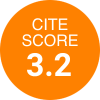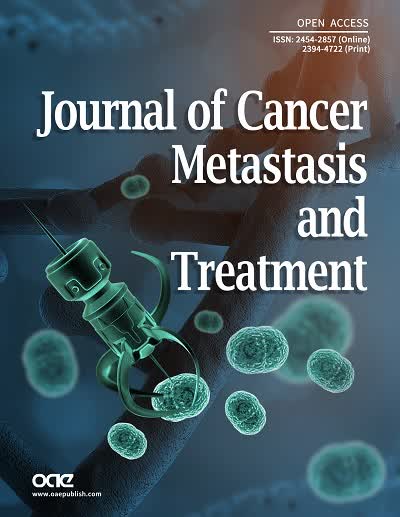REFERENCES
1. Fearon K, Strasser F, Anker SD, Bosaeus I, Bruera E, et al. Definition and classification of cancer cachexia: an international consensus. Lancet Oncol 2011;12:489-95.
2. Fearon KC, Voss AC, Hustead DS; Cancer Cachexia Study Group. Definition of cancer cachexia: effect of weight loss, reduced food intake, and systemic inflammation on functional status and prognosis. Am J Clin Nutr 2006;83:1345-50.
4. Douglas E, McMillan DC. Towards a simple objective framework for the investigation and treatment of cancer cachexia: the Glasgow Prognostic Score. Cancer Treat Rev 2014;40:685-91.
5. Arends J, Bachmann P, Baracos V. ESPEN guidelines on nutrition in cancer patients. Clin Nutr 2017;36:11-48.
8. de Matos-Neto E, Lima J, dePeriera W, Figuerêdo R, Riccardi D, et al. Systemic inflammation in cachexia - is tumor cytokine expression profile the culprit? Front Immunol 2015;6:1-11.
9. Baracos VE, Martin L, Korc M, Guttridge DC, Fearon KCH. Cancer-associated cachexia. Nat Rev Dis Primer 2018;4:17105.
10. Tracey K, Lowry SF, Cerami A. Cachectin: a hormone that triggers acute shock and chronic cachexia. J Infect Dis 1988;157:413-20.
11. Sharma M, Kambadur R, Sriram S, Lokireddy S, McFarlane CD. Molecular targets of cancer cachexia: Opportunities for pharmanutritional approaches. PharmaNutrition 2014;2:126-8.
12. Sherry BA, Gelin J, Fong Y, Marano M, Wei H, et al. Anticachectin/tumor necrosis factor-alpha antibodies attenuate development of cachexia in tumor models. FASEB J 1989;3:1956-62.
15. Noguchi Y, Vydelingum N, Younes R, Fried S, Brennan M. Tumor-induced alterations in tissue lipoprotein lipase activity and mRNA levels. Cancer Res 1991;51:863-9.
16. Torelli G, Meguid M, Moldawer LL, Edwards C, Kim H, et al. Use of recombinant human soluble TNF receptor in anorectic tumor-bearing rats. Am J Physiol 1999;277:850-5.
17. Llovera M, García-Martínez C, Lopez-Soriano J, Agell N, Lopez-Soriano FJ, et al. Protein turnover in skeletal muscle of tumour-bearing mice overexpressing the soluble TNF receptor-1. Cancer Lett 1998;130:19-27.
18. Yu Z, Li P, Hannink M, Stamler J, Yan Z. Fiber type-specific nitric oxide protects oxidative myofibers against cachectic stimuli. PLoS One 2008;3:e2086.
20. Thompson M, Cooper S, Parry B, Tuckey J. Increased expression of the mRNA for hormone-sensitive lipase in adipose tissue of cancer patients. Biochim Biophys Acta 1993;1180:236-42.
21. Karayiannakis A, Syrigos K, Polychronidis A, Pitiakoudis M, Bounovas A, et al. Serum levels of tumor necrosis factor-α and nutritional status in pancreatic cancer patients. Anticancer Res 2001;21:1355-8.
22. Maltoni M, Fabbri L, Nanni O, Scarpi E, Pezzi L, et al. Serum levels of tumour necrosis factor alpha and other cytokines do not correlate with weight loss and anorexia in cancer patients. Support Care Cancer 1997;5:130-5.
23. Hou YC, Wang CJ, Chen HY, Wang HC, Tung HL, et al. Elevated serum interleukin-8 level correlates with cancer-related cachexia and sarcopenia: an indicator for pancreatic cancer outcomes. J Clin Med 2018;7:502.
24. Haller O, Kochs G, Weber F. The interferon response circuit: Induction and suppression by pathogenic viruses. Virology 2006;344:119-30.
25. Mah A, Cooper M. Metabolic regulation of natural killer cell IFN-γ production. Crit Rev Immunol 2016;36:131-47.
26. Stanton S, Disis M. Clinical significance of tumor-infiltrating lymphocytes in breast cancer. J Immunother Cancer 2016;4:59.
28. Matthys P, Dukmans R, Proost P, Van Damme J, Heremans H, et al. Severe cachexia in mice inoculated with interferon-γ-producing tumor cells. Int J Cancer 1991;49:77-82.
29. Matthys P, Heremans H, Opdenakker G, Billiau A. Anti-interferon-gamma antibody treatment, growth of Lewis lung tumours in mice and tumour associated cachexia. Eur J Cancer 1991;27:182-7.
30. Langstein H, Doherty G, Fraker D, Buresh C, Norton JA. The roles of gamma-interferon and tumor necrosis factor alpha in an experimental rat model of cancer cachexia. Cancer Res 1991;51:2302-6.
31. Gregoire F, Broux N, Hauser N, Heremans H, Van Damme J, et al. Interferon-gamma and interleukin-1 beta inhibit adipoconversion in cultured rodent preadipocytes. J Cell Physiol 1992;151:300-9.
33. Dinarello C. Interleukin-1 in the pathogenesis and treatment of inflammatory diseases. Blood 2011;117:3720-32.
34. Hardardottir I, Doerrler W, Feingold K, Grunfeld C. Cytokines stimulate lipolysis and decrease lipoprotein lipase activity in cultured fat cells by a prostaglandin independent mechanism. Biochem Biophys Res Commun 1992;186:237-43.
35. McCarthy H, Dryden S, Williams G. Interleukin-1 beta-induced anorexia and pyrexia in rat: relationship to hypothalamic neuropeptide Y. Am J Physiol 1995;269:852-7.
36. Sato T, Laviano A, Meguid M, Chen C, Rossi Fanelli F, et al. Involvement of plasma leptin, insulin and free tryptophan in cytokine-induced anorexia. Clin Nutr 2003;22:139-46.
37. Costelli P, Llovera M, Carbo N, García-Martínez C, Lopez-Sorianoq F, et al. Interleukin-1 receptor antagonist (IL-1ra) is unable to reverse cachexia in rats bearing an ascites hepatoma (Yoshida AH-130). Cancer Lett 1995;95:33-8.
38. Strassmann G, Masui Y, Chizzonite R, Fong M. Mechanisms of experimental cancer cachexia. Local involvement of IL-1 in colon-26 tumor. J Immunol 1993;150:2341-5.
39. Deans DAC, Wigmore SJ, Gilmour H, Paterson-Brown S, Ross JA, et al. Elevated tumour interleukin-1β is associated with systemic inflammation: a marker of reduced survival in gastro-oesophageal cancer. Br J Cancer 2006;95:1568-75.
40. Wellenstein M, Coffelt S, Duits D, Miltenburg M, Slagter M, et al. Loss of p53 triggers WNT-dependent systemic inflammation to drive breast cancer metastasis. Nature 2019;572:538-42.
41. Scheede-Bergdahl C, Watt H, Trutschnigg B, Kilgour R, Haggarty A, et al. Is IL-6 the best pro-inflammatory biomarker of clinical outcomes of cancer cachexia? Clin Nutr 2012;31:85-8.
42. Zhang D, Zheng H, Zhou Y, Tang X, Yu B, et al. Association of IL-1beta gene polymorphism with cachexia from locally advanced gastric cancer. BMC Cancer 2007;7:45.
43. Miller A, McLeod L, Alhayyani S, Szczepny A, Watkins D, et al. Blockade of the IL-6 trans-signalling/STAT3 axis suppresses cachexia in Kras-induced lung adenocarcinoma. Oncogene 2017;36:3059-66.
44. White J. IL-6, cancer and cachexia: metabolic dysfunction creates the perfect storm. Translational cancer research. Transl Cancer Res 2017;6:280-5.
45. Pettersen K, Andersen S, Degen S, Tadini V, Grosjean J, et al. Cancer cachexia associates with a systemic autophagy-inducing activity mimicked by cancer cell-derived IL-6 trans-signalling. Sci Rep 2017;7:2046.
46. Rupert J, Bonetto A, Narasimhan, Koniaris L. IL-6 trans signaling among tumour, muscle and fat mediates pancreatic cancer cachexia. J Cachexia Sarcopenia Muscle 2018;9:1121-84.
47. O’Riordain M, Falconer J, Maingay J, Fearon K, Ross J. Peripheral blood cells from weight-losing cancer patients control the hepatic acute phase response by a primarily interleukin-6 dependent mechanism. Int J Oncol 1999;15:823-7.
48. Hishida A, Okugawa Y, Morimoto Y, Shirai Y, Okamoto K, et al. Genetic influence of cytokine polymorphisms on the clinical outcome of Japanese gastrointestinal cancer patients in palliative care. Oncol Lett 2019;17:623-9.
49. Johns N, Stretch C, Tan BHL, Solheim TS, Sørhaug S, et al. New genetic signatures associated with cancer cachexia as defined by low skeletal muscle index and weight loss. J Cachexia Sarcopenia Muscle 2017;8:122-30.
50. Marvel D, Gabrilovich D. Myeloid-derived suppressor cells in the tumor microenvironment: expect the unexpected. J Clin Invest 2015;125:3356-64.
51. Gajewski T, Schreiber H, Fu Y. Innate and adaptive immune cells in the tumor microenvironment. Nat Immunol 2013;14:1014-22.
52. Guo C, Buranych A, Sarkar D, Fisher P, Wang X. The role of tumor-associated macrophages in tumor vascularization. Vasc Cell 2013;5:20.
53. Cuenca A, Cuenca A, Winfield R, Joiner D, Gentile L, et al. Novel role for tumor-induced expansion of myeloid derived cells in cancer cachexia. J Immunol 2015;192:6111-9.
54. Erdem M, Moeckel S, Jumpertz S, John C, Fragoulis A, et al. Macrophages protect against loss of adipose tissue during cancer cachexia. J Cachexia Sarcopenia Muscle 2019; doi: 10.1002/jcsm.12450.
55. Tang X, Mo C, Wang Y, Wei D, Xiao H. Anti-tumour strategies aiming to target tumour-associated macrophages. Immunology 2013;138:93-104.
56. Lindau D, Gielen P, Kroesen M, Wesseling P, Adema G. The immunosuppressive tumour network: myeloid-derived suppressor cells, regulatory T cells and natural killer T cells. Immunology 2013;138:105-15.
57. Noy R, Pollard J. Tumor-associated macrophages: from mechanisms to therapy. Immunity 2015;41:49-61.
58. Laine A, Lyengar P, Pandita T. The role of inflammatory pathways in cancer-associated cachexia and radiation resistance. Mol Cancer Res 2013;11:967-72.
59. Deshmane S, Kremlev S, Amini S, Sawaya B. Monocyte chemoattractant protein-1 (MCP-1): an overview. J Interferon Cytokine Res 2009;29:313-26.
60. Gooden M, de Bock G, Leffers N, Daemen T, Nijman H. The prognostic influence of tumour inflitrating lymphocytes in cancer: a systematic review with meta analysis. Br J Cancer 2011;105:93-103.
61. Albini A, Bruno A, Noonan DM, Mortara L. Contribution to tumour angiogenesis from innate immune cells withing the tumour microenvironment: implications for Immunotherapy. Front Immunol 2018;9:527.
62. Singel KL, Segal B. Neutrophils in the tumour microenvironment: trying to heal the wound that cannot heal. Immunol Rev 2016;273:329-43.
63. Sproston NR, Ashworth JJ. Role of C-reactive protein at sites of inflammation and infection. Front Immunol 2018;9:754.
64. Laird BJ, Kaasa S, McMillan DC, Fallon MT, Hjermstad MJ, et al. Prognostic factors in patients with advanced cancer: a comparison of clinicopathological factors and the development of an inflammation-based prognostic system. Am Assoc Cancer Res 2013;19:5456-64.
65. Siebert S, Tsoukas A, Robertson J, McInnes I. Cytokines as therapeutic targets in rheumatoid arthritis and other inflammatory diseases. Pharmacol Rev 2015;67:280-309.
66. Maini R, Breedveld F, Kalden J, Smolen J, Furst D, et al. Sustained improvement over two years in physical function, structural damage, and signs and symptoms among patients with rheumatoid arthritis treated with infliximab and methotrexate. Arthritis Rheum 2004;50:1051-65.
67. Marcora S, Chester K, Mittal G, Lemmey A, Maddison P. Randomized phase 2 trial of anti-tumor necrosis factor therapy for cachexia in patients with early rheumatoid arthritis. Am J Clin Nutr 2006;84:1463-72.
68. Wu C, Fernandez S, Criswell T, Chidiac T, Guttridge D, et al. Disrupting cytokine signaling in pancreatic cancer: a phase I/II study of etanercept in combination with gemcitabine in patients with advanced disease. Pancreas 2013;42:813-8.
69. Jatoi A, Dakhil S, Nguyen P, Sloan J, Kugler J, et al. A placebo-controlled double blind trial of etanercept for the cancer anorexia/weight loss syndrome: results from N00C1 from the North Central Cancer Treatment Group. Cancer 2007;110:1396-403.
70. Wiedenmann B, Malfertheiner P, Friess H, Ritch P, Arseneau J, et al. A multicenter, phase II study of infliximab plus gemcitabine in pancreatic cancer cachexia. J Support Oncol 2008;6:18-25.
71. Chasen M, Hirschman S, Bhargava R. Phase II study of the novel peptide-nucleic acid OHR118 in the management of cancer-related anorexia/cachexia. J Am Med Dir Assoc 2011;12:62-7.
72. Tracey K. TNF and other cytokines in the metabolism of septic shock and cachexia. Clin Nutr 1992;11:1-11.
73. Hong D, Hui D, Bruera E, Janku F, Naing A, et al. MABp1, a first-in-class true human antibody targeting interleukin-1α in refractory cancers: an open-label, phase 1 dose-escalation and expansion study. Lancet Oncol 2014;15:656-66.
74. Fisher G. A phase III study of xilonix in refractory colorectal cancer patients with weight loss. J Clin Oncol 2015;33:685-5.
75. Hickish T, Andre T, Wyrwicz L, Saunders M, Sarosiek T, et al. MABp1 as a novel antibody treatment for advanced colorectal cancer: a randomised, double-blind, placebo-controlled, phase 3 study. Lancet Oncol 2017;18:192-201.
76. Paspaliaris V, Langan B, DeAndrea R, Wood J, Tsouvelekas A, et al. Phase I/II study of IP-1510 a novel interleukin-1 receptor antagonist in the management of cancer-related cachexia. J Cachexia Sarcopenia Muscle 2011;2:261.
77. Bayliss T, Smith J, Schuster M, Dragnev K, Rigas J. A humanized anti-IL-6 antibody (ALD518) in non-small cell lung cancer. Expert Opin Biol Ther 2011;11:1663-8.
78. Coss C, Clinton S, Phelps M. Cachectic cancer patients: immune to check-point inhibitor therapy? Clin Cancer Res 2018;24:5787-9.
79. Kollipara R, Fughhi I, Batus M, Basu S, Borgia J, et al. Decreasing BMI/weight immediately prior to starting anti-PD-1/PDL-1 monoclonal antibodies for treatment for stage IV non-small cell lung cancer is associated with shorter progression-free survival. J Clin Oncol 2019;37:e20710.
80. Multani M, Tarhoni I, Fughhi I, Basu S, Batus M, et al. Changes in skeletal muscle mass during PD-1 and PD-L1 checkpoint inhibitor therapy in advanced-stage non-small cell lung cancer patients. J Clin Oncol 2019;37:e14061.
81. Dolan RD, Laird BJA, Horgan PG, McMillan DC. The prognostic value of the systemic inflammatory response in randomised clinical trials in cancer: a systematic review. Crit Rev Oncol Hematol 2018;132:130-7.
82. Roxburgh CSD, McMillan DC. Cancer and systemic inflammation: treat the tumour and treat the host. Br J Cancer 2014;110:1409-12.








